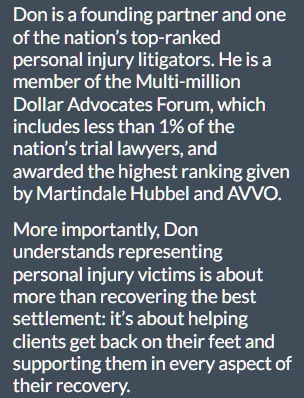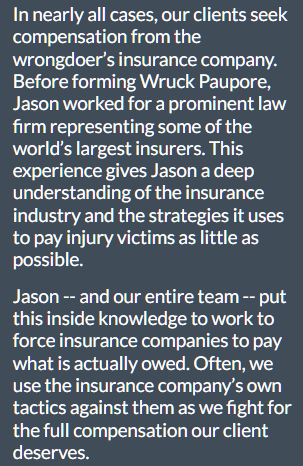



Nobody likes to see the doctor. Doctors and nurses are here to help, but seeing them means something is wrong. When patients have significant medical problems, they rely on their doctors to take care of them. As much as we wish otherwise, doctors are not perfect, and mistakes happen from time to time. Some mistakes are excusable, but others might be acts of negligence.
A medical mistake would become a case of malpractice if the doctor, physician, or other medical professional were negligent in administering treatment. Not every case of a treatment gone wrong is malpractice, as most doctors do what they believe is best. It is when their actions become so inexcusable as to be deemed negligent that malpractice becomes an issue.
Call our Indianapolis medical malpractice lawyers right away if you believe you were harmed at the hands of a doctor, nurse, or another medical professional. We can conduct a free case review and help you determine if you have a case of malpractice. Call Wruck Paupore at (219) 322-1166 to arrange a meeting with our team.
As said before, not every instance of treatment gone wrong is a case of medical malpractice. Doctors are acutely aware of how much their patients rely on them, and they often go to great lengths to explain to their patients that treatments are not always successful. Just because your treatment did not work or encountered a complication does not mean your doctor committed malpractice.
Malpractice might arise when your doctor negligently treats you. Negligence is much more than honest mistakes by physicians doing their best. In short, negligence in a medical malpractice case involves a lack of care or skill from your doctor, a nurse, or another medical professional that causes your treatment to fall below the relevant standards of care in the medical field.
Medical malpractice typically involves proving the elements of negligence. Duty, breach, causation, and damages must be shown for your malpractice case to be successful. You must show that the doctor owed you a duty of care, that they breached or violated that duty of care, that their actions caused your injuries, and that your injuries and damages are real and not hypothetical.
In many cases, courts are reluctant to award damages where the medical professional claims they did what they thought was best for the patient. Treatment can be unpredictable, and doctors cannot guarantee successful outcomes for all patients. If you are unsure whether your case arises to malpractice, talk to our Indianapolis medical malpractice attorneys right away.
Your damages may include any injuries you sustained because of your doctor’s negligence. Damages may include new physical injuries, pre-existing injuries made worse by your doctor, and more. Talk to our Indianapolis medical malpractice attorneys about the possible damages in your case. It is important to claim all possible damages in your lawsuit to maximize your potential compensation award.
In many cases, a patient’s injuries include a pre-existing medical condition that was made worse by a doctor’s negligence. For example, suppose you go to your doctor for an acute kidney infection, and you are prescribed medication to treat the condition. However, the medication is not effective because your doctor mistakenly prescribed the wrong drugs. Instead, your infection becomes worse because you do not have the necessary medicine. Your doctor can often be held liable for medical malpractice for such a glaring mistake.
You might also sustain new injuries you did not have before you sought treatment from your doctor. An infection in the incision in your leg from surgery could become infected because of negligently unsanitary hospital conditions. A serious infection could leave you with lasting damage, or you might even lose the whole leg.
The costs of treating any new or worsened ailments must also be factored into your damages calculations. A surgery gone wrong could require multiple additional surgeries to correct. All the while, you must endure unbearable pain and emotional trauma. You are also very likely not working during this time as you are recovering from the botched medical treatment. Your lost income should also be considered when assessing damages.
Punitive damages are possible but are not always awarded. Punitive damages are not meant to compensate you for your losses but to punish your doctor for behaving so negligently. These damages are not awarded automatically, and you must plead these damages and offer supporting evidence. Under Indiana Code § 34-54-3-4, punitive damages are capped at three times your total compensatory damages but must not be more than $50,000.
You will need strong evidence to support your claims of medical malpractice. These cases are extremely difficult for the average person to handle alone because they do not fully understand the complicated medical or legal knowledge involved in their case. Not only must your evidence conform to rules of admissibility, but it must also demonstrate that your doctor was medically negligent. This often involves establishing what exactly is considered acceptable practices in medicine.
First, you absolutely need your medical records. Hospitals and doctors’ offices take copious notes on their patients from the time they come in, to when they leave. Every aspect of your treatment should be documented as it happens. These records are paramount to proving that your treatment was negligent.
Second, you will need expert witnesses with extensive medical knowledge to establish what medical practices are acceptable when it comes to treating patients with your ailments. The expert may then compare accepted practices to the practices employed by your doctor. Medical malpractice cases are rife with medical knowledge and jargon. An expert is usually necessary to break the information down into more understandable terms for the court and jurors. Our experienced Indianapolis medical malpractice attorneys can help you gather the necessary evidence.
In Indiana, a Medical Review Panel must be convened to review your case before your lawsuit continues. You or the opposing party must request a panel within 20 days of the complaint being filed. Either party may request the panel, but no panel will come together if nobody makes a request. The panel will review evidence submitted before it and determine if a preventable medical error did in fact occur. The panel’s report can be used as evidence at your subsequent trial.
A Medical Review Panel is composed of three doctors and one attorney. The attorney acts as the panel chair and provides guidance to the doctors on the appropriate law. However, the attorney has no say in the panel’s final decision. Of the three doctors, one is chosen by the plaintiff, one by the defendant, and the third is typically agreed upon by both parties. Similarly, the attorney on the panel is selected by both parties.
The panel typically has about six months to make a final decision. The final report must be issued in writing and signed by all panel members. The panel’s fees are typically paid by the “winner,” or the person most favored by the final decision. Medical Review Panel fees can add up to about $3,000 in some cases.
It is important to carefully select the members of your panel to ensure the panel is knowledgeable about the relevant medical fields and there are no biases. For example, if you are suing a hospital, you want to make sure no doctors on your panel worked at that hospital or completed their residency there in the past. You also want to make sure the attorney on the panel is a skilled medical malpractice lawyer who has experience in Medical Review Panels. Our Indianapolis medical malpractice lawyers can help you select the best possible members of your panel.
It is important that the doctors on your panel are familiar with the relevant medical fields. If your allegations of medical malpractice involve an open heart surgery gone wrong, you will want to make sure your panel has doctors with experience in cardiology and surgery. If your opponent selects a doctor you feel has no place on the panel - perhaps due to inexperience or bias - you can challenge that selection. Discuss panel selection with our Indianapolis medical malpractice attorneys for help with your Medical Review Panel.
The Medical Review Panel is called together to review evidence submitted by the parties. You can submit almost any evidence you believe supports your claims of medical malpractice. Your opponent may also submit evidence that contradicts your claims. Common pieces of evidence include medical records and charts, x-rays, lab test results, and any other medical records or documentation regarding your illness or condition. Doctors and hospitals tend to keep thorough and copious records, so there may be a lot of evidence to consider.
You should also submit evidence of how your life has been affected by your doctor’s malpractice. Witness depositions from people close to you may inform the panel of your pain, suffering, and overall decline in quality of life. Our Indianapolis medical malpractice attorneys can help you select the strongest evidence to submit to your Medical Review Panel.
Call our Indianapolis medical malpractice lawyers right away if you sought treatment from a doctor or other medical professional and were left seriously injured. Our team can help you hold your doctor liable and collect compensation. Call Wruck Paupore at (219) 322-1166 for a case review free of charge.
Don is a founding partner and one of the nation’s top-ranked personal injury litigators. He is a member of the Multi-million Dollar Advocates Forum, which includes less than 1% of the nation’s trial lawyers, and awarded the highest ranking given by Martindale Hubbel and AVVO.
More importantly, Don understands representing personal injury victims is about more than recovering the best settlement: it’s about helping clients get back on their feet and supporting them in every aspect of their recovery.

In nearly all cases, our clients seek compensation from the wrongdoer’s insurance company. Before forming Wruck Paupore, Jason worked for a prominent law firm representing some of the world’s largest insurers. This experience gives Jason a deep understanding of the insurance industry and the strategies it uses to pay injury victims as little as possible.
Jason -- and our entire team -- put this inside knowledge to work to force insurance companies to pay what is actually owed. Often, we use the insurance company’s own tactics against them as we fight for the full compensation our client deserves.

For more than four decades, Keith has been fighting for injury victims. During that time, he’s watched the insurance industry change, with insurers now more interested in protecting their stock price than treating injury victims fairly.
Since the beginning, Keith has put people first. From his childhood in Gary, Indiana during the 1960’s and working his way through law school, Keith has risen to become one of the Midwest’s most respected trial lawyers. He has never forgotten that being a lawyer is about helping people -- and seeing injury victims through struggles in a way that could change their lives forever.
Over the decades, Keith, Don and Jason have fought relentlessly for clients, even when other lawyers have said the case was impossible to win.


© 2025
Terms of Service | Privacy Policy | Resources | Blog | Sitemap

© 2022 Wruck Paupore PC
Terms of Service | Privacy Policy